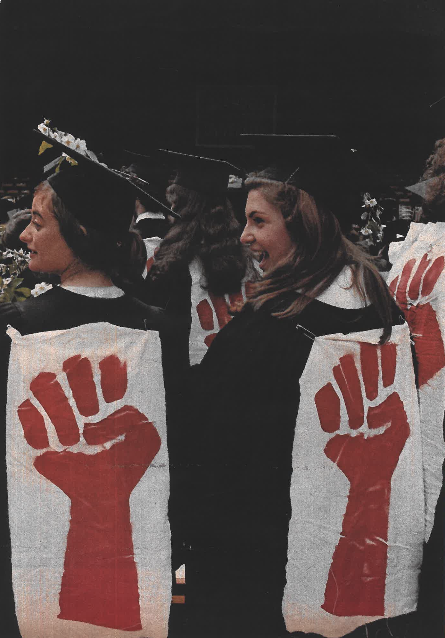Life Magazine profiled our 1969 Commencement
Life Magazine published an article in June of 1969 entitled “The Class of ’69 – With eloquent defiance, top students protest right through commencement.” It reported on the campus unrest then roiling on campuses, including Yale.
The speeches and remarks from student leaders, speaking at commencement and other formal assemblies were included verbatim. Our own Mac Thompson was featured, with Life commenting that
“Only twice in 75 years has Yale broken with tradition and presented a speaker at commencement—in 1962 President Kennedy, and last week Class Secretary William Thompson (left), who denounced the Vietnam war.”
Here is a scanned pdf of the article showing the original layout. The full text of Mac’s remarks that Life excerpted are shown below. Some of the other student leaders profiled went on to very high-profile public positions, including Hillary Rodham, Ira Magaziner, and others. Click the link above to get a copyu or see the reprinted original reproduced at the bottom on this page if that’s easier.
The article opens by observing generally:
“Their grievances had been voiced all through this year of campus turbulence. Vietnam, racism, adult hypocrisy. Now it was commencement time — the ritual of robes and mortarboards that traditionally marks a coming of age and an end to youthful rebellion. It was no surprise that campus protest was the topic of many of the adult dignitaries invited to address the graduating seniors—-the nation’s concern is such that over 20 states have already passed laws that curb campus activism, and a bill being considered by a House committee would have Congress first approve disciplinary rules before granting funds and then withhold the funds if activism is not dealt with firmly.
The surprise was the students who were asked to speak in behalf of their classmates. These were not extremists, but valedictorians and elected student leaders.
Through their scathing words and clenched fists, the Class of ’69 made clear that the protest will go on.”
The article than showcases the actual student leaders. Yale got top billing:
A sense of frustration and despair overwhelms us’ – Mac Thompson, Yale
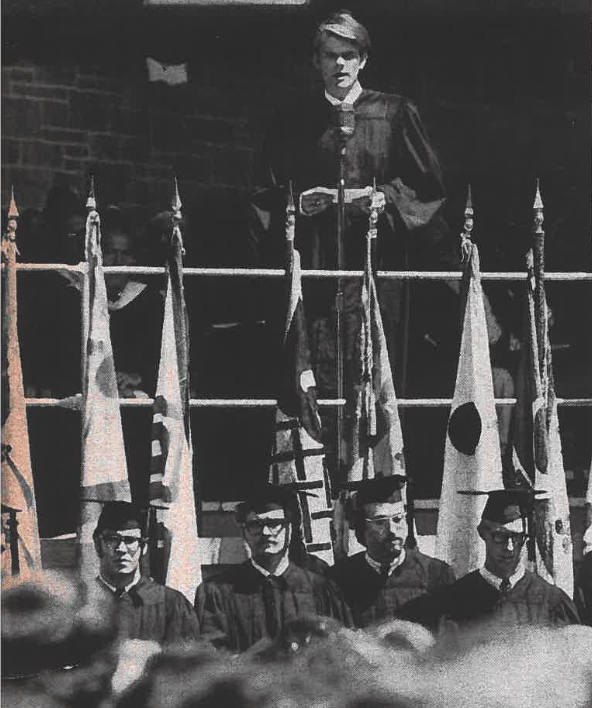
“Graduation is traditionally a joyous occasion; a time of great celebration; a time for hope. But today despair outweighs hope; mourning outweighs celebration. This is not a traditional commencement; it cannot be. In a time of crisis, tradition must be broken.
For the past four years, we at Yale have witnessed a war justified by false assumptions and sustained by an unwillingness to accept new ones. It is a distant war, a war that is despised. And yet it cannot be forgotten or ignored. Because of the draft the war is brought close to all of us. Most of us are plagued by the pain of an uncertain future and the prospect of fighting in a war which cannot be supported. Within the next year some of us will die, others will be maimed, in a war which has been declared a mistake. And yet it continues.
Equally devastating have been our miscalculations at home. The war is destroying not one nation but two-the Vietnamese and our own. Our cities are in decay; our universities are in chaos; our poor are hungry. And yet our monev and our energies are expended upon war and the perpetuation of war.
Today as we leave Yale a sense of frustration and despair overwhelms us. On some campuses this frustration has erupted into a violence which has shocked the American public. And yet that same public silently condones violence abroad in senseless military action killing thousands of Americans and Vietnamese. The connection between the violence here and abroad must be made: the violence at home will not end while the violence abroad continues. The one feeds the other. To understand the frustrations causing violence, however, is not to condone it. The great majority of students would not advocate violent confrontation. But we do demand a confrontation with reason. The death and destruction in Vietnam have not been explained adequately because they cannot be explained. Then why does the war continue?
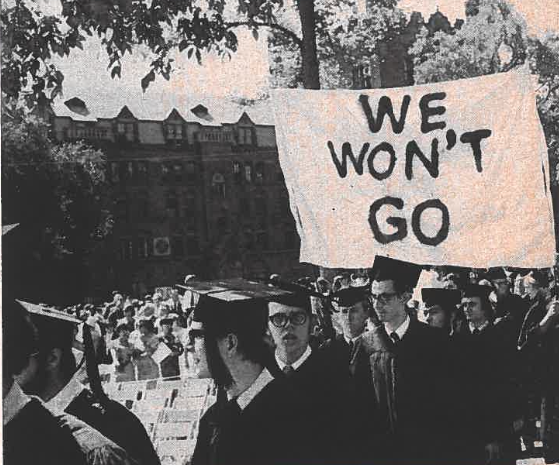
For the past four years our leaders have attempted to soothe us with predictions of peace. We are tired of their rhetoric-of promises to act without action; of a willingness to take risks without risks. False rhetoric is no longer acceptable. Nor will token action such as the withdrawal of small numbers of troops, without a decrease in the current level of fighting, be greeted with more than dismay.
We will not be appeased by cynical attempts to silence public criticism of the war. As long as the fighting continues at its present level, our opposition to the war will also continue. Immediate action must be taken to extricate us from the disaster that is Vietnam. The war must end now; and the fight for our cities, for our nation, for our people must begin.
WILLIAM M. THOMPSON, Yale University
That rosy future —it is a hoax’ – Stephanie Mills, Mills College
 Traditionally, commencement exercises are the occasion for fatuous comments on the future of the graduates present… . My depressing comment on that rosy future, that infinite future, is that it is a hoax. Our days as a race on this planet are, at this moment, numbered, and the reason for our finite, unrosy future is that we are breeding ourselves out of existence.
Traditionally, commencement exercises are the occasion for fatuous comments on the future of the graduates present… . My depressing comment on that rosy future, that infinite future, is that it is a hoax. Our days as a race on this planet are, at this moment, numbered, and the reason for our finite, unrosy future is that we are breeding ourselves out of existence.
Within the next 10 years, we will witness widespread famines and possible global plagues raging through famine-weakened populations. … I am terribly saddened by the fact that the most humane thing for me to do is to have no children at all. As an ex-potential parent, I have asked myself what kind of world my children would grow up in. And the answer was, “Not very pretty, not very clean. Sad, in fact.” Because you see, if the population continues to grow, the facilities to accommodate that population must grow, too. Thus we have more highways and fewer trees, more electricity and fewer undammed rivers, more cities and less clean air.
Mankind has spread across the face of the earth like a great unthinking, unfeeling cancer. We have horribly disfigured this planet, ungrateful and shortsighted animals that we are. Our frontier spirit involves no reverence for any forms of life other than our own, and now we are even threatening ourselves with the ultimate disrespect of suicide. Rather than blindly walking into the abyss, we must take warning and try to extricate ourselves from it before it is really too late.
STEPHANIE MILLS, Mills College
‘ Protest is an attempt to forge an identity’ – Hillary Rodham, Wellesley
 The issues of sharing power and responsibility, and of assuming power and responsibility, have been general concerns on campuses throughout the world. But underlying those concerns there is a theme, a theme which is so trite and so old because the words are so familiar. It talks about integrity and trust and respect.
The issues of sharing power and responsibility, and of assuming power and responsibility, have been general concerns on campuses throughout the world. But underlying those concerns there is a theme, a theme which is so trite and so old because the words are so familiar. It talks about integrity and trust and respect.
Words have a funny way of trapping our minds on the way to our tongues, but there are necessary means even in this multimedia age for attempting to come to grips with some of the inarticulate, maybe even inarticulable, things that we’re feeling. We are, all of us, exploring a world that none of us understands and attempting to create within that uncertainty. But there are some things we feel—we feel that our prevailing, acquisitive and competitive corporate life, including, tragically, the universities, is not the way of life for us. We’re searching for more immediate, ecstatic and penetrating modes of living. And so our questions, our questions about our institutions, about our colleges, about our churches, about our government, continue.
Every protest, every dissent, is unabashedly an attempt to forge an identity in this particular age. That attempt at forging, for many of us over the past four years, has meant coming to terms with our humanness. Within the context of a society that we perceive—now we can talk about reality, and I would like to talk about reality sometime, authentic reality, inauthentic reality, and what we have to accept of what we see-but your perception of it is that it hovers often between the possibility of disaster and the potentiality for imaginatively responding to men’s needs.
There’s a very strange conservative strain that goes through a lot of New Left, collegiate protests that I find very intriguing because it harks back to a lot of the old virtues, to the fulfillment of original ideas. And it’s also a very unique American experience. It’s such a great adventure. If the experiment in human living doesn’t work in this country, in this age, it’s not going to work anywhere.
HILLARY RODHAM, Wellesley College
‘Realities exist but they’re not real to me’ – Ira Magaziner, Brown
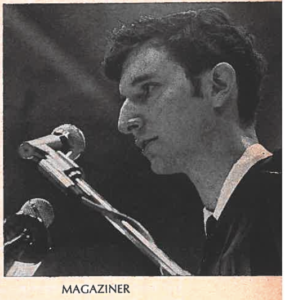 I wish I could forget all the times that I’ve been called a young idealist by someone in the process of telling me that he once was a young idealist and that I, as he, will learn the realities of society and settle down in it. That’s the problem, I think, right there. Being idealistic is usually being opposed to being realistic, which means considerations of why one must compromise one’s ideals in the face of society’s realities.
I wish I could forget all the times that I’ve been called a young idealist by someone in the process of telling me that he once was a young idealist and that I, as he, will learn the realities of society and settle down in it. That’s the problem, I think, right there. Being idealistic is usually being opposed to being realistic, which means considerations of why one must compromise one’s ideals in the face of society’s realities.
Society right now has very few realities for me. They exist but they’re not real to me. I can’t believe them. I can’t believe a Hamburger Hill, I can’t believe a gas bomb attack by police on a peaceful protest in Berkeley, I can’t believe us spending millions of dollars to send soldiers over to West Germany to engage in a war game. I can’t believe financing the burning of our crops while millions starve. I can’t believe analysts seriously discussing how decisions are made by whether Johnson or Nixon feel that their place in history is going to be preserved if they make certain decisions while people die. I can’t believe the pictures I see of the war and I can’t believe the pictures I see of the ghettos. These can’t be realities to me.
I acknowledge that they exist but I can’t allow myself to see them as my real world because if I do that, then I’m willing to accept them. The way things should be has got to be the way things are, or none of us should be able to sleep well at night. We should lose sleep not out of fear of our economic security or our property because the Negroes are rioting again. But we should lose sleep because we are doing things that are wrong and we’re allowing things that are wrong to go on in our society and we’re accepting them.
IRA MAGAZINER, Brown University
An answer from their elders: beware of self-righteousness
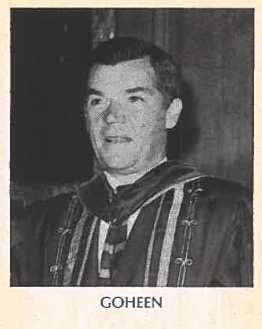 You can’t afford to be more than 85% right’ – Robert Goheen, Princeton President
You can’t afford to be more than 85% right’ – Robert Goheen, Princeton President
An old friend of mine was fond of saying, “If you would persuade someone to your view, you can’t afford to be more than 85% right.”
It must be the awareness of human fallibility which we all carry within us that makes the man without error so obnoxious to us. Surely we have all experienced the irritation which is evoked by the person who acts as though he had his own pipeline to the Almighty. Claims put forth from such a posture usually founder in a chasm of hostility created by the posture itself.
Some of you have told me that you feel your generation sorely beset by frustrations and tensions. I share your concerns. There are indeed tremendous imperfections in the American society. There is much to justify your impatience. But there are good elements as well, and many opportunities for creative action.
One of these fortunate conditions, I suggest, may lie in the very affluence which many of you deplore. Corrupting though it is to some, and though it has so grievously passed by others, the economic abundance of this country today provides the opportunity from which many can devote themselves to service — can be free to work at setting things right.
To those of you who intend to be engaged in the struggle to right our society’s wrongs — and I would hope this included most of you — my final word is: “Beware the narrowness, the deception, the self-defeat that self-righteousness carries with it.”
ROBERT F. GOHEEN President, Princeton University, at Princeton
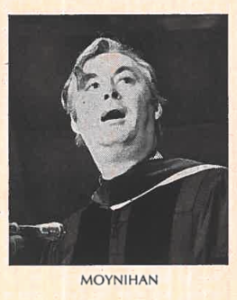 ‘Government can’t provide a meaning to life’
‘Government can’t provide a meaning to life’
All in all, there is cause enough for despair. As Midge Dechter has put it: “When you are caught between left and right, the only way to 80 is down.” But we are not yet down. We are a strong and competent people, increasingly, 1 think, aware of our troubles and dangers and shortcomings.
The challenge to authority that is now upon us can strengthen and renew institutions as much as it can weaken them. And it can be fun. There is always room, as Orwell wrote, “for one more custard pie.” We are not especially well equipped in conceptual terms to ride out the storm ahead, but there are things we know without fully understanding, and one of these is the ultimate value of privacy, and the final ruin when all things have become political.
The stability of a democracy depends very much on the people making a careful distinction between what government can do and what it cannot do. To demand what can be done is altogether in order; some may wish such things accomplished, some may not, and the majority may decide. But to seek that which cannot be provided, especially to do so with the passionate but misinformed conviction that it can be, is to create the conditions of frustration and ruin.
What is it government cannot provide? It cannot provide values to persons who have none, or who have lost those they had. It cannot provide a meaning to life. It cannot provide inner peace. It can provide outlets for moral energies, but it cannot create those energies.
In particular, government cannot cope with the crisis in values which is sweeping the Western world. It cannot respond to the fact that so many of our young people do not believe what those before them have believed, do not accept the authority of institutions and customs whose authority has heretofore been accepted, do not embrace or even very much like the culture that they inherit.
DANIEL P. MOYNIHAN, Special White House Adviser, at Notre Dame
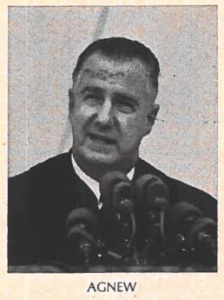 Tomorrow you are the Establishment’ – Spiro Agnew
Tomorrow you are the Establishment’ – Spiro Agnew
Your generation is not the first youth who ever questioned the efficacy of a custodial generation. You are not the first to aggressively challenge the fundamental values of a society. Such challenges are normal, proper and the basis of human improvement.
We are not in turmoil because of your testing. We are in trouble because my generation has apparently failed to define and defend either its achievements or its inheritance from past generations of Americans.
A society which comes to fear its children is effete. A sniveling, hand-wringing power structure deserves the violent rebellion it encourages. If my generation doesn’t stop cringing, yours will inherit a lawless society where emotion and muscle displace reason.
A society which looks calmly into the logic or illogic of its youths’ anger and ambition, accepting the rational and rejecting the immature, is alive. Ask yourselves which kind of society you want for tomorrow — tomorrow when you are the Establishment.
SPIRO T. AGNEW. Vice President, at Ohio State
Scanned copy of the article follows:
